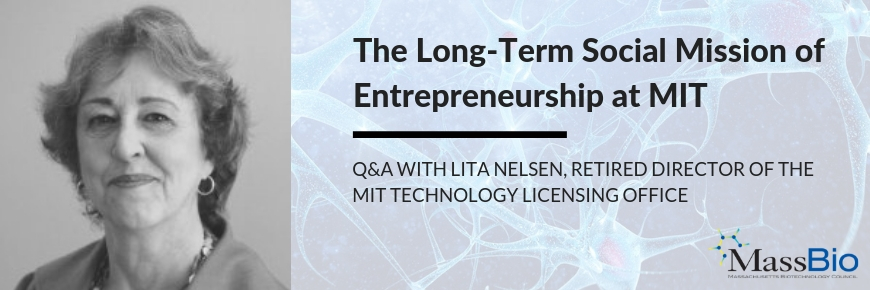
Lita Nelsen, Retired Director of the MIT Technology Licensing Office, will be honored as the recipient of the Henri A. Termeer Innovative Leadership Award during MassBio’s 2019 Annual Meeting, now the State of Possible Conference, on March 27-28th. We sat down with Lita to learn more about her work and what excites her most about the future of the biotech industry. Answers have been edited for clarity.
What most excites you about the future of the life sciences industry?
Personally, it’s what is going on in the brain. If you go back 20 years the brain was a black box, scientists measured what was put in and what was taken out, but not what was in the middle. Through extraordinary progress in imaging, coupled with the genetic revolution, we’re now beginning to figure out how it works. To me, neurodegenerative disease is the greatest unmet medical need, from mood disorders to Alzheimer’s, but it’s not the most desirable to invest in because the rate of failure has been high. But we should be solving the hard problems even if established industry doesn’t like them. Fortunately, there are players out there that are tackling this, as we’ve seen through responses in government funding – NIH funding for Alzheimer’s has increased fivefold – and the entry of new nonprofits, such as World Without Alzheimer’s Disease, that are investing in very early innovative approaches to curing the disease.
What accomplishments most proud of?
There are several accomplishments I’m most proud of:
- The opportunity that MIT gave me to form a team where people were motivated by the work, by feeling safe and by feeling that they could do their best. It was a very human environment, but we got a hell of a lot done with a great team.
- I’m proud that MIT was one of the universities in tech transfer that understood our job was not about the amount of money we could bring in, but about the technology we could get moving and invested in. Similar to other schools like Stanford and Michigan, MIT understood that our work was a long-term social mission, not just a business about dollars brought in.
- Finally, I’m proud of the number of businesses we got off the ground that have transformed Cambridge and made Kendall Square what it is today. Kendall Square used to be a desert with small warehouses and one greasy diner, but now look at what it is. It’s created jobs, a flourishing local economy, cures for diseases, and it’s creating a path for the future of biotechnology – that’s the Kendall Square story and we were an important part of it.
How did you accomplish all that you did?
Because MIT does not exist as a silo. There has been continuous interaction between the business and entrepreneurial community of the university. Each does what it’s good at rather than trying to do the other’s job, but the communities also interact. For example, almost all entities within MIT that teach entrepreneurship or help students and faculty start new companies involve volunteer instructors, judges, or mentors from the venture capital and business community. We know each other on both sides of the academic/industry wall and that’s why it works in Kendall Square. That’s part of the magic.
What advice do you have for women looking to break out of academia and directly into the biotech industry?
There’s a lot of opportunity in biotech now because the industry is expanding. Women have done very well, and the glass ceiling has raised a number of stories since my early years – even though it still exists at the top and on SAB’s and Boards. The most important advice I have for women is to network as much as possible, and for women in academia, to network with faculty who have also founded companies. In between entry level positions and the C-Suite most people get hired through a network of people — people who know your talent and can help you find a place for it. However, this can be a disservice to women only in the sense that most decision makers are men and men don’t automatically think of women when they think of job openings. It may be a little harder, but women cannot be afraid to ask, and they cannot wait to be asked. Never shy away from asking for informational interviews – you have to kiss a few frogs before you find your prince. Ask politely, socially and courteously and, at the very least, you’ll get on people’s radars.
To honor Lita’s leadership and to learn more about the greatest issues impacting our industry, register for the State of Possible Conference.